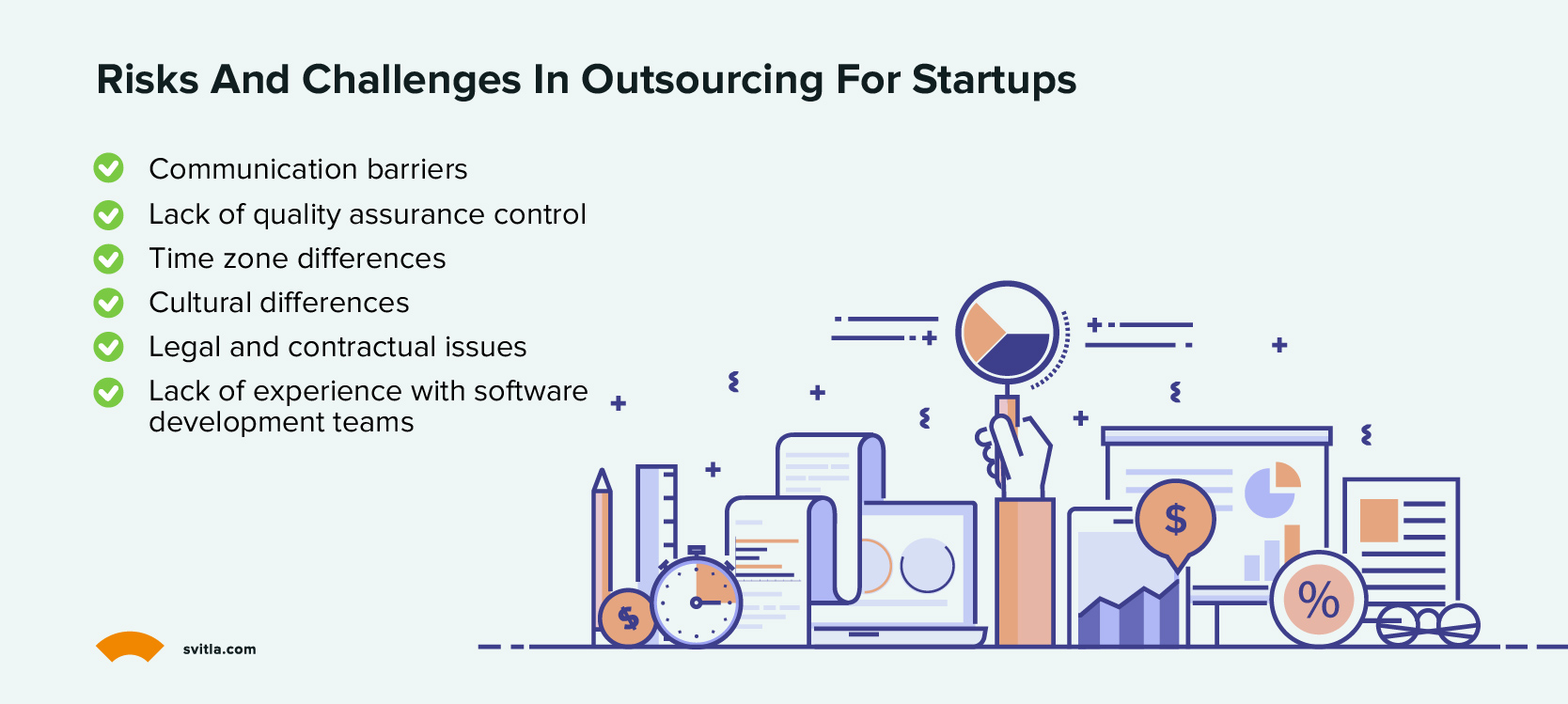For startups, swiftly adapting to market dynamics and demands is imperative, particularly in software development, where the stakes for innovation are sky-high.
However, outsourcing startup software development is often met with resistance, fueled by concerns of losing control of the project’s direction, increasing budgets, and not meeting the project’s vision.
This anxiety, compounded by the challenges of working with a globally dispersed team, each with its distinct culture, can be challenging to grapple with.
Despite these genuine fears, the narrative around startup software development is shifting towards viewing outsourcing software development for startups as a strategic asset. Why? Startups have the tangible opportunity of accessing global talent pools and leveraging emerging technology at a fraction of the cost, all while retaining focus on strategic objectives. What’s not to love?
This article will explore how startups can flip the script on outsourcing fears and challenges. Let’s get going!
Risks and challenges in outsourcing for startups
Outsourcing software development for startups presents a unique set of challenges and risks, which, if not carefully managed, can derail even the most promising projects.
Communication Barriers
One of the most immediate challenges in outsourcing software development for startups is overcoming communication barriers.
When working with offshore teams, language barriers, unclear communication protocols, and inadequate briefing can lead to misunderstandings, misaligned expectations, and errors in the final product. The lack of face-to-face interactions amplifies these issues, making it hard to convey nuances and complex ideas that are often better discussed in person.
Perceived Loss of Quality Control
Quality is chief. Ensuring your project is delivered to your expectations is another concern for startups. Outsourcing adds a layer of distance between the startup and the developers, making quality control difficult to be perceived as attained.
Time Zone Differences
Working across different time zones can be both a win and a loss. On one hand, it allows for round-the-clock work cycles, which can lead to accelerated deployment times. On the other hand, it can lead to delays in communication, difficulties in scheduling meetings, and a disconnect between teams.
Cultural Differences
Cultural differences between the startup and the outsourced team can lead to disjointed work ethics, attitudes toward deadlines and quality, and communication styles. These differences can affect team dynamics, productivity, and even the interpretation of project goals.
Legal and Contractual Issues
Startups must ensure that their contracts with outsourcing partners are comprehensive, clear, and legally binding, covering detailed aspects around intellectual property (IP) rights, data privacy, obligations, and more.
Lack of Experience with Software Development Teams
The reality is that when teams are remote, startups often lack experience managing teams, which is understandable. Hiring experienced project managers with outsourced teams can be a game-changer in navigating the complex landscape.

Software Development Services for Startups: What Consider Before Cooperation?
1. Project Requirements
First things first, startups should thoroughly understand and document project requirements. With a clear vision of what they want to achieve with the software development project, including critical elements like objectives, the scope, tech stack, and timelines, startups can gain clarity and an understanding of how everything fits in the broader business strategy of their journey.
Detailed requirements help you set realistic expectations and serve as a benchmark against which the success of the outsourcing engagement can be measured. They also provide a basis for accurate quotations from potential partners and reduce the likelihood of scope creep.
2. Criteria for Selecting the Company Offering Software Development Services for Startups
Startups should consider:
- Expertise and experience: Look for a company with a proven track record in your industry or technology domain. Assess their portfolio for similar projects and ask for references.
- Cultural fit: Ensure the company's work culture, communication style, and values align with yours. A good cultural fit can enhance collaboration and innovation.
- Technical skills: Evaluate the technical competency of the team. Consider conducting technical interviews or asking for demonstrations of their capabilities.
- Process and methodology: Ensure the vendor’s processes and methodologies are compatible with your requirements and expectations for agility, quality, and communication.
- Cost: Consider the value the outsourcing partner brings regarding quality, reliability, and technology expertise.
3. Legal Considerations
- Contracts: Clearly outline contracts that include deliverables, timelines, payment terms, confidentiality obligations, intellectual property rights, and mechanisms for dispute resolution.
- Compliance and security: Ensure the outsourcing company complies with relevant legal and regulatory requirements, especially data protection and privacy laws like GDPR or HIPAA, depending on your industry.
- Intellectual Property (IP) Rights: Uphold robust clauses regarding the ownership of IP created during the project.
- Exit strategy: Include terms that address the termination of the contract, such as notice periods, transition assistance, and handling of unfinished work.
How to Mitigate Common Risks in Startup Software Development
Mitigating the common risks associated with outsourcing software development is critical for startup companies to ensure their projects' success and safeguard their investments.
Clear and Comprehensive Documentation
Documentation is a foundational step in mitigating risks in startup software development. Documentation ranges from requirements specifications, project timelines, and deliverable milestones to quality benchmarks.
Think of documentation as the roadmap for processes and a reference point for the startup and the outsourcing company to clearly understand what needs to be achieved and what is expected.
Rigorous Selection Process
Startups should conduct comprehensive selection processes to evaluate the vendor’s portfolio, testimonials, and track record in similar projects.
Technical skills, project management, and communication processes can make or break a project, so it’s important for the startup company to have visibility of these aspects to gauge satisfaction.
Strong Communication Channels
Establishing strong communication channels is vital to overcoming the geographical and cultural barriers inherent in outsourcing. This involves setting up regular check-ins, using project management tools, and agreeing on a common language for communication.
Emphasizing transparency and open communication lines can help identify issues early on, facilitate swift resolutions, and maintain alignment with project goals.
Quality Control Measures
Implementing quality control measures throughout the development process can help ensure that the final product meets the required standards. This includes conducting regular code reviews, setting up automated testing, and integrating continuous integration/continuous deployment (CI/CD) pipelines.
Legal and Contractual Safeguards
Draft clear contracts that outline intellectual property rights, the scope of work, confidentiality agreements, mechanisms for conflict resolution, and more.
Ensuring the outsourcing partner complies with data protection laws relevant to your industry is also paramount, as it will help you navigate complexities, ensuring contracts serve your best interests.
Establishing a Governance Framework
A governance framework can help manage the outsourcing relationship and project delivery effectively. This framework should define roles, responsibilities, decision-making processes, and escalation procedures. It provides a structured approach to managing the outsourcing partnership, ensuring accountability, and facilitating effective communication.
Flexibility and Scalability
Startups should seek to build flexibility and scalability into their outsourcing arrangements. This means being prepared to scale the team up or down based on project requirements and being open to adjusting project scopes as necessary. A flexible approach can help manage costs, adapt to changing market conditions, and pivot project directions as needed.
Continuous Learning and Adaptation
Finally, viewing outsourcing as a continuous learning process can help startups refine their strategies. This involves analyzing completed projects to identify lessons learned, areas for improvement, and best practices that can be applied to future projects. Continuous adaptation and improvement can turn the challenges of outsourcing into opportunities for growth and innovation.
Partnering with Svitla Systems for Your Startup’s Outsourcing Needs
Svitla Systems stands out as a dependable partner for startups, blending technical prowess, a commitment to quality, continuous engagement, and a comprehensive understanding of startup dynamics.
Partnering with Svitla Systems for your startup software development opens doors to an expansive global talent network, emerging technologies, and adaptable project delivery frameworks that scale with your evolving needs. This collaboration positions startups to turn software development hurdles into catalysts for growth, driving innovation and securing long-term success.





